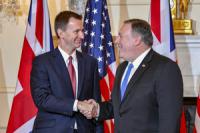-
Do we need a moratorium on germline gene editing?
In the wake of the news from China about He Jiankui’s gene-edited babies, many scientists are calling for a moratorium on germline gene-editing. Nature considered the topic sufficiently important to publish the call by several top researchers and ethicists for a moratorium.
-
-
Four ways social media platforms could stop the spread of hateful content in aftermath of terror attacks
Monitoring hateful content is always difficult and even the most advanced systems accidentally miss some. But during terrorist attacks the big platforms face particularly significant challenges. As research has shown, terrorist attacks precipitate huge spikes in online hate, overrunning platforms’ reporting systems. Lots of the people who upload and share this content also know how to deceive the platforms and get round their existing checks. So what can platforms do to take down extremist and hateful content immediately after terrorist attacks? I propose four special measures which are needed to specifically target the short term influx of hate.
-
-
Israeli Supreme Court bars extreme Jewish candidate from running in April election
Israel’s Supreme Court has disqualified the leader of the extremist Otzma Yehudit (Jewish Power) party, Michael Ben-Ari, from running in the upcoming general election in April. Overturning an earlier decision by Israel’s electoral committee, the court banned Ben Ari in an 8-1 vote, citing his anti-Arab ideology and “incitement to racism.”
-
-
49 killed in terrorist attack on mosques in New Zealand
At least forty-nine people were killed and more than twenty seriously wounded Friday in shootings at two mosques in Christchurch, New Zealand. Three men and one woman are in custody. New Zealand Prime Minister Jacinda Ardern said none of them were on security watch lists. The terrorist group’s leader, a 28-year old Australian, has been charged with murder.
-
-
New Zealand attacker’s “manifesto”: White supremacist, anti-immigration ideology
Brenton Tarrant, the 28-years on Australian mastermind behind the attacks on two mosques in New Zealand on Friday, posted a 74-page “manifesto” explaining his motivations. The manifesto expresses his far right, white supremacist, anti-immigrant ideology. He describes himself as an ethnonationalist and a fascist. The manifesto says that the attack on the mosques aims to send a message to Muslims that “nowhere in the world is safe,” and create “an atmosphere of fear” among Muslims.
-
-
Christchurch mosque shootings must end New Zealand’s innocence about right-wing terrorism
Public opinion surveys of attitudes tend to show that a majority of New Zealanders are in favor of diversity and see immigration as providing various benefits for the country. But extremist politics, including the extreme nationalist and white supremacist politics that appear to be at the core of this attack on Muslims, have been part of our community for a long time.
-
-
U.S. to Germany: Huawei deal could harm intelligence sharing

The United States on Monday warned Germany about future “information sharing” if it uses “untrusted vendors” in its 5G telecom infrastructure amid debate over whether Chinese IT giant Huawei is an espionage risk.
-
-
Another Steel Dossier detail appears true
On the final page of his 35-page dossier, former British intelligence officer Christopher Steele refers to a company, whose name is redacted, that allegedly was used to hack the Democratic party. Today, the New York Times identifies the company and its owner, Aleksej Gubarev, and says that according to a newly revealed report, the allegations against the Russian technology entrepreneur’s operations check out.
-
-
Russia attempted 2018 interference, gearing up to infiltrate election systems in 2020
Defense Department and Homeland Security officials warn Russia did try to interfere in the 2018 election, and the United States is not prepared for what foreign adversaries likely will launch in 2020. One official told lawmakers on the House Appropriations Homeland Security Subcommittee that “what keeps him up at night” is thinking about the new ways adversaries will attempt to infiltrate US election systems in 2020.
-
-
Trapdoor found in SwissVote election system

Researchers have examined the source code published as part of the SwissPost e-voting system, provided by Scytl, and discovered a cryptographic trapdoor. If exploited, researchers say this could allow insiders who ran or implemented the election system to modify votes undetected.
-
-
3,000 ISIS fighters surrender as end of caliphate nears

ISIS once controlled large parts of Syria and Iraq, but now thousands of ISIS fighters have handed themselves in. Kurdish-led units reported some IS fighters were continuing to resist.
-
-
Fraudulent news, disinformation become “new normal” political tactics

New report warns of the risk of fraudulent news and online disinformation becoming a normalized part of U.S. political discourse. The report sounds an alarm that fraudulent news and online disinformation, which distort public discourse, erode faith in journalism, and skew voting decisions, are becoming part of the toolbox of hotly contested modern campaigns.
-
-
Information literacy must be improved to stop spread of “fake news”
It is not difficult to verify whether a new piece of information is accurate; however, most people do not take that step before sharing it on social media, regardless of age, social class or gender, a new study has found.
-
-
Deterrence in the cyber age: U.K. Foreign Secretary's speech

U.K. foreign secretary Jeremy Hunt last Thursday spoke at Glasgow University on cybersecurity and the U.K. government’s approach to deterring cybercrime. “In the cyber age, an authoritarian regime armed with nothing more ambitious than a laptop computer could try to manipulate our democracy, Hunt said. “For every example of publicly attributed interference [by Russia], there have been others that never saw the light of day.” He added: “The material fact is that the Russian state has tried to subvert democracy,” concluding: “We can no longer afford to wait until an authoritarian regime demonstrably succeeds in changing the outcome of an election and weakening trust in the integrity of democracy itself. The risk is that after just a few cases, a pall of suspicion would descend over a democratic process – and once that happens, the damage would be difficult, perhaps impossible, to repair.”
-
-
Legal experts: Emergency declaration may not be quickest way to build wall
Even if President Donald Trump gets his way, eminent domain lawyers say a variety of legal issues would arise surrounding private land seizures that could delay wall construction for years — and even derail it entirely.
-
More headlines
The long view
Factories First: Winning the Drone War Before It Starts
Wars are won by factories before they are won on the battlefield,Martin C. Feldmann writes, noting that the United States lacks the manufacturing depth for the coming drone age. Rectifying this situation “will take far more than procurement tweaks,” Feldmann writes. “It demands a national-level, wartime-scale industrial mobilization.”
No Nation Is an Island: The Dangers of Modern U.S. Isolationism
The resurgence of isolationist sentiment in American politics is understandable but misguided. While the desire to refocus on domestic renewal is justified, retreating from the world will not bring the security, prosperity, or sovereignty that its proponents promise. On the contrary, it invites instability, diminishes U.S. influence, and erodes the democratic order the U.S. helped forge.
Fragmented by Design: USAID’s Dismantling and the Future of American Foreign Aid
The Trump administration launched an aggressive restructuring of U.S. foreign aid, effectively dismantling the United States Agency for International Development (USAID). The humanitarian and geopolitical fallout of the demise of USAID includes shuttered clinics, destroyed food aid, and China’s growing influence in the global south. This new era of American soft power will determine how, and whether, the U.S. continues to lead in global development.
Water Wars: A Historic Agreement Between Mexico and US Is Ramping Up Border Tension
As climate change drives rising temperatures and changes in rainfall, Mexico and the US are in the middle of a conflict over water, putting an additional strain on their relationship. Partly due to constant droughts, Mexico has struggled to maintain its water deliveries for much of the last 25 years, deliveries to which it is obligated by a 1944 water-sharing agreement between the two countries.
How Disastrous Was the Trump-Putin Meeting?
In Alaska, Trump got played by Putin. Therefore, Steven Pifer writes, the European leaders and Zelensky have to “diplomatically offer suggestions to walk Trump back from a position that he does not appear to understand would be bad for Ukraine, bad for Europe, and bad for American interests. And they have to do so without setting off an explosion that could disrupt U.S.-Ukrainian and U.S.-European relations—all to the delight of Putin and the Kremlin.”
How Male Grievance Fuels Radicalization and Extremist Violence
Social extremism is evolving in reach and form. While traditional racial supremacy ideologies remain, contemporary movements are now often fueled by something more personal and emotionally resonant: male grievance.
